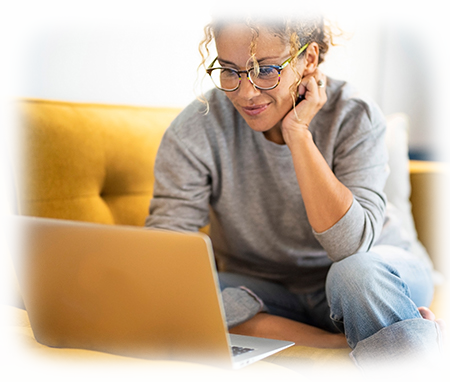Offering online (and in-person) therapy to anyone in Idaho…
Finding the right fit…
You’ve tried to find a therapist that’s close to you and feels like a good match – but that person simply doesn’t exist. You’d have to factor in a LOT of drive time to see someone that’s even close to a good fit. You don’t have that kind of time in your schedule (and even if you did, you wouldn’t want to do all that driving).
So, you’ve considered online therapy. If you’ve searched around, you’ve heard some not-so-great things about some of the “big box” options – like therapists suddenly leaving the service after you’ve started to trust them. You might be wary about their privacy practices, too.
Nowadays, lots of therapists are comfortable and even enjoy providing therapy online now. That means you get more options.
 It really does make sense to go online.
It really does make sense to go online.
I love it for many reasons.
If you’re living in a relatively isolated (and probably gorgeous!) place or don’t have the time to travel back and forth to an office, it saves you all that trouble.
Or maybe you have the sniffles or have been exposed to something contagious and don’t want to risk getting other people sick. Online therapy comes to the rescue!
In addition, many people can “go deeper” online than they do in person. There is something about being in your own space that feels safer and more comfortable. Knowing you don’t have to leave immediately after therapy opens the doors for getting in touch with your feelings at a deeper level.
Plus, the convenience can’t be beat. You get to pick your chair… or bed… or floor! And you can have the environment JUST the way YOU like it: scents, lighting, temperature… it’s all how you want it when you’re doing therapy online.
And all your creature-comforts are available to you: pets, weighted blankets, fidgets, your favorite tea… bring whatever makes you feel comfortable.
With online therapy, you get the support you need, without making it any harder than it needs to be.
 Wondering if it’s as effective as in-person therapy?
Wondering if it’s as effective as in-person therapy?
Research shows it is just as effective as traditional therapy in an office. Some things are lost, though:
Hugs are lost.
If you are a hugger, we should meet in person. Oh, and I ONLY hug with your permission!
Assumptions are lost.
I think that’s a good thing. Online therapy forces me to check in with you explicitly about what you are feeling, thinking, and experiencing – rather than assuming I know based on your body language or facial expressions.
Germs are lost.
I think that’s enough said about that.
The commute is lost.
But really… who wants to battle traffic and rush to find parking??
Empathy is lost.
Let me explain (it’s not what you think)! When doing therapy online, empaths and highly sensitive people sometimes lose that “feeling what other people are feeling” experience. That can actually be helpful because you get to focus on what YOU are feeling instead.
 What about privacy?
What about privacy?
The technology I use (and the link you click) is secure and private – no concerns there. It is HIPAA-compliant and integrated into my electronic health record system. I am the only one who has access to it.
If you’re concerned about privacy, there are things you can do on YOUR end to protect your confidentiality (it can be tricky if you’re at home or in an office with others around):
Wear headphones.
This reduces what others could potentially hear, so I always use them. If you have Bluetooth headphones, just make sure to stay connected to your device.
Play music or white noise just outside your door to muffle your sound.
Sit in your car (not driving, please!) or outside if you have enough privacy.
Ask for privacy.
Can your spouse take your kid outside to play?
Can people near you wear their own headphones?
(If requests like these are hard for you, we can work on that!)
 Do technology problems ever crop up?
Do technology problems ever crop up?
This is super rare in my practice. It probably helps that I’m tech savvy.
I have a very strong Internet connection, so yours just needs to be “strong enough.” Even 5G on your phone is usually sufficient. We can test this during your free consultation call.
If things aren’t working, I stay calm and know what to do. I always text if you aren’t online after the first few minutes so that we can troubleshoot if there are tech problems.
Here are some things you can do to plan ahead (the number-one way to avoid tech issues!):
Download the app if using an app-supported device.
Charge your device in advance if you need to be unplugged somewhere.
Have headphones handy.
Test your settings on the call screen ahead of time.
Have reminders easily accessible from the device you plan to use (e.g., email if on a computer; text if you’re using your phone).
Will online therapy work for you?
When it comes down to it, the most important thing is that YOU are comfortable with who you are seeing and where you are doing it.
If you need to test it out before fully committing, let me know, and we can plan for that!
Schedule your consultation today.
